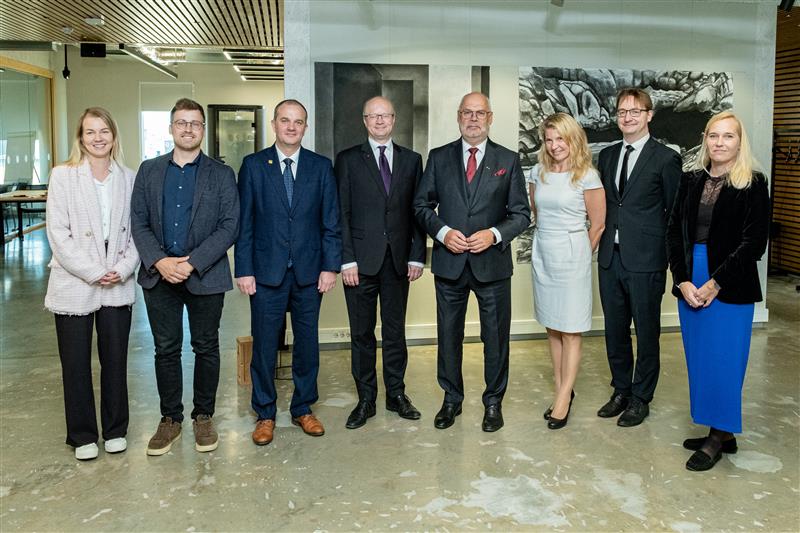Expert: data quality will become crucial
In order to use the machine learning facilities, company data must be of high quality. As many industrial companies face the problem that data is being collected but is insufficient, Juhan-Madis Pukk, member of the advisory board of the Artificial Intelligence and Robotics Centre AIRE (AI & Robotics Estonia), encourages companies to approach them on this issue.
Juhan Pukk, from Flowit, believes that Estonian industrial companies would be better able to harness AI and robotics technology if the data they collect is of high quality. The topic of data quality came up during the presentation of AIRE demo project applications. “What we see today is that although companies collect a lot of data, it is the formal side that does not allow it to be used digitally,” said Pukk. He added that when collecting data, it is important to know how much to collect and in what form.
Expert advice
Pukk said that competent advice on what, how and how much data to collect can be obtained by using AIRE experts. “It all starts with the company having a vision of where it wants to go and what it wants to achieve. If I want to increase sales, I look at whether the sales data is in order, if I want to improve production quality, I look at how and how much data is collected from production,” Pukk explained.
For data, the journey starts, as it always does in companies, in the sales department and ends in the accounting department. If we collect data in a single-entry way throughout the cycle (all the data is entered only once into a defined software or database and other departments get the data from there), there is a good chance that the data can be used for machine learning. As an example of the bad side, consider the case where several departments: both production and sales, enter the same customer into their database but with different fonts, which causes confusion in all departments and makes it impossible to use the data without cleaning it.
“It’s nuances like this that cause all the problems, the data has to be cleaned up in advance for digitisation and it can be a very labour-intensive process. There is a lot of talk today about the digital twin of the enterprise, which can help to solve production, internal logistics or cost management processes, but the gaps in data collection and the fact that data quality is often underestimated can be the obstacle,” Pukk said.
“That’s why it’s a good idea to start from a basic level, let’s get the data right. Come to AIRE, you can get a first experience of how to use it. Companies can learn a lot from it: what can be achieved and what they could achieve, and in the process we can get the baseline in place. If we can’t get the data right, we can’t digitise and we can’t use machine learning,” Pukk said.
Working with researchers
Pukk said that AIRE’s demonstration service allows manufacturing companies to test artificial intelligence and robotics technologies in collaboration with university researchers before investing. It also encourages companies to make further investments in digital technologies. “Another thing that stood out during the defence of the projects was the companies’ desire to solve the world’s problems with a single project,” said Pukk.
“Rather, they should first take a critical look at their business process. If you have identified an area that could be solved, accelerated or made more efficient by using a new digital tool, AI, then come up with a solution and try to find a solution in cooperation with the university. Rather, it’s worth taking a narrow process and doing that small thing well, with the aim of leveraging your strengths or reducing your weaknesses,” he said.
“When a company comes in and wants to tackle all areas at once, we see a lot of these projects fail. Particularly when we’re talking about data, machine learning, the bigger the project, the higher the risk of failure – the level of complexity gets so high for the developer and the company,” Pukk acknowledged.
He says it is worthwhile for companies to think about the competitive advantage they can gain from machine learning and whether the same wisdom can be used elsewhere. “You need to think about the big picture, what are the benefits and how do I manage and develop it further. Machine learning is very powerful, but it’s just a technology. The winner will be the one who can best use it in their own company or enterprise-wide process,” he said.
Juhan Pukk: 5 recommendations to start with
- Understand your business process and its uniqueness.
- Review the structure, quality and volume of your data, either yourself or with AIRE experts.
- Either by yourself or together with AIRE experts, identify processes in your company where machine learning could be helpful.
- Together with the experts from the University, put together an application for a round of demo-projects and start your company’s journey to implement modern technologies in front of the trolley to achieve your goals.
- Take advantage of the support network offered by AIRE to create new business models.





